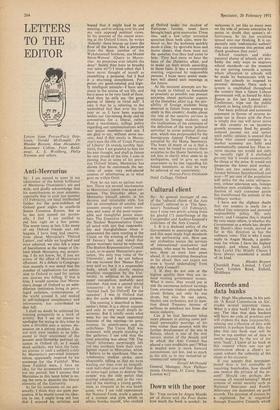Records and data banks
Sir: Hugh Macpherson, in his arti- cle 'A Royal Commission on Sin', evades several important issues. What is a data bank? He does not say. The idea that data bankers will have no code of practices and will explore the data irresponsibly, relating one collection of data with another, is perhaps feared. Also the idea that any bank user will be free to tap another set of data is surely negated by the use of the term 'bank'. I know of no bank in this country where one can get information about a client's ac- count without the authority of the client or his executor.
If one accepts that computer- stored data is too accessible to inquiring busybodies, how should one protect the privacy of the re- cord? Should one perhaps dis- courage all record-keeping? Many systems of social security such as National Insurance and Family Allowance are dependent on good records. The payment of doctors by a capitation fee is organised through Executive Councils which
maintain lists of persons who are registered with a practice. I low will such lists be kept up to date if some record of movements of pa- tients from one practice to another is not maintained?
There has been increasing con- cern for the health and happiness of individuals in the community as the living conditions become more crowded and there is much concern over the prevention of health hazards in the environment. How would the dangers of a specific chemical to which v.orkers in a cer- tain industry were exposed be dis- covered if records identifying those workers and their subsequent health had not been kept? How can the possibly dangerous effects of contraceptive pills be recognised early unless long-term health re- cords are kept of persons who have consumed the materials and their subsequent illnesses and reproduc- tive histories be followed? How can the causes of heart disease or cancer be found unless long-term identified personal records are maintained somewhere? Is an epileptic or schizophrenic person better cared for at work and by his fellows if the fact of his epi- lepsy or schizophrenia is kept secret only to himself and his doctor?
Do we really wish to make re- search doctors impotent? Or do we wish to establish a sensible ethical practice of record-keeping? Can We evolve a method by which any individual, who fears that his record contains information which he does not wish to have publicly available, can have access to what is stored and can then appeal to some impartial examining body to have such in- formation suppressed? If what is stored is true and someone uses the information to a person's detri- ment, will that person be free in law to sue for defamation? Do our laws protect us enough as they stand?
I suggest that the present drive
against the recording .of personal data and data bank witch-hunting is more likely to do harm by tying the hands of those who seek to do good. In a crowded community some organisation is essential. Anarchic demolition of record sys- tems will harm the community by Causing disorganisation, and mak- ing criminal practices even easier. Granted that data systems are, in scnN totalitarian systems, a poten- tial weapon of great harm; but the safeguard against totalitarian sys- tems is in our own common sense in choosing responsible people to represent us in Parliament.



































 Previous page
Previous page